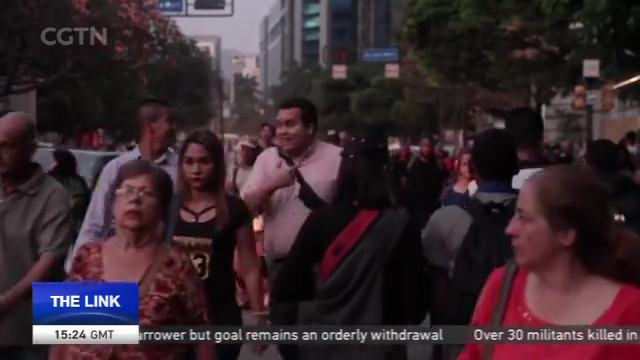
08:56, 14-Mar-2019
Across the Americas: Venezuelans struggle as nationwide power outage extends to seventh day
Updated
08:50, 17-Mar-2019
02:36

A massive power blackout is still causing misery across Venezuela. The lights went out last week. And officials say they're working hard to put the power back on across the country. At least 20 people have died as a result of the outage. CGTN'S Juan Carlos Lamas reports from Caracas.
Intermittent power has been restored to some parts of Venezuela but others have been without electricity since last Thursday. And people are taking to the streets in Caracas to say they're fed up.
"I'd like this nightmare to end, and I would like for a foreign intervention in Venezuela. It's clear enough that we cannot restore peace alone."
Ninety percent of the industrial and commercial sector in Venezuela is paralyzed due to the blackout, according to the Venezuelan Federation of Chambers of Commerce and Production.
What little food people had in refrigerators has spoiled and temperatures are rising. Looting has been reported in grocery stores, restaurants and pharmacies. Hospitals are working to keep people alive using power from generators.
"I feel that the Venezuelan people do not deserve this. Venezuela is an oil rich country, with many natural resources we should not go through this kind of thing."
Water has stopped running in taps across the country. Caracas residents have started carrying buckets of water collected from the Guaire River, one of the most contaminated rivers in Venezuela.
"Without water we cannot cook, do laundry, there's nothing we can do without water, Unfortunately, for us, we are here in this polluted river looking for water. It's humiliating that we have reached this situation."
The loss to the oil industry, commercial and service sectors is reported to be nearly 900 million dollars, since the blackout started. Fuel supplies are running low in Caracas.
President Maduro has said the power failure is a result of sabotage.
Many energy experts dismiss the charges of sabotage, saying the blackout is the result of years of underinvestment, corruption and brain drain.
No matter the cause Venezuelans say they've had enough and they're pleading with authorities to look for solutions, since millions of lives are at risk. Juan Carlos Lamas, CGTN, Caracas.

SITEMAP
Copyright © 2018 CGTN. Beijing ICP prepared NO.16065310-3
Copyright © 2018 CGTN. Beijing ICP prepared NO.16065310-3